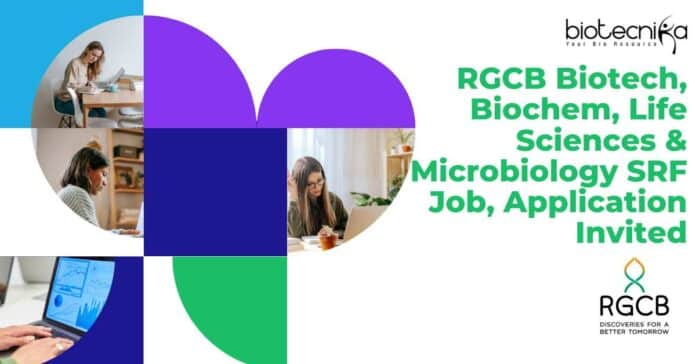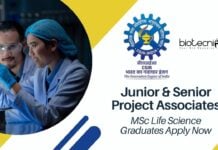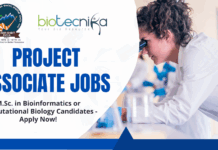RGCB SRF Post Available For MSc Biotech, Biochem, Microbiology Candidates
RGCB SRF Post Available For MSc Biotech, Biochem, Microbiology Candidates. Rajiv Gandhi Centre for Biotechnology Job. SRF RGCB job. Interested and eligible applicants can check out all of the details on the same below –
If you are wondering how the interview questions will be for the role of Senior Research Fellow at RGCB, then make sure you check out all of the questions at the bottom of the page.
This job expires in
#Adv. # 13/2023
Applications are invited from suitable candidates for one position of Senior Research Fellow in a DBT funded project (SAHAJ) entitled “Comprehensive Mass Spectrometry-based Clinical Lipidomics platforms for promoting biomedical research and advanced training for Indian researchers” in the Laboratory of Dr. Abdul Jaleel at Rajiv Gandhi Centre for Biotechnology, Thiruvananthapuram.
Name of the Post – Senior Research Fellow
No. of Posts – 01
Name of the PI – Dr. Abdul Jaleel
Age – Below 30 years as of 31st May 2023. Age relaxation will be given as per Govt. of India norms.
Duration – Initially for a period of one year and extendable up to termination of the project (12th August 2025) whichever is earlier based on performance evaluation on a yearly basis.
Selection Process & Instructions –
- Applications should be submitted online.
- Candidates who are currently working in Government firms should send applications through proper channels.
- The last date for receiving completed applications is May 31, 2023.
- If a candidate wishes to apply for different positions, separate applications should be submitted for each position. Selection of the position will not entitle the candidate to any future positions at RGCB (permanent or otherwise). As with all project positions at RGCB, the position will be co-terminus with the end of the project.
Applications which are not in the prescribed format will summarily be rejected.
Only those fulfilling the above criteria need to apply. Applicants will be shortlisted for the ONLINE selection interview based on eligibility criteria. Selection of suitable candidates will be made based on qualifications and performance in the selection interview.
Essential Qualifications –
- The candidate must have a Post Graduate Degree with at least 1st class in life sciences, microbiology, biotechnology, biochemistry or any other relevant subjects from a recognized University
- The candidate must have completed at least two years of research experience after the Post Graduate Degree.
- The candidate must have a minimum of one first-authored or two co-authored publications in a SCI-Indexed Journal.
Desirable Qualifications – Experience in Mass spectrometry-based analysis.
Emoluments – ₹ 35,000/- + 16% HRA per month.
Are you looking for some possible interview questions for the role of Senior Research Fellow at RGCB, then read below
- Can you provide an overview of your research experience after completing your Post Graduate Degree in life sciences? How has this experience prepared you for the role of a Senior Research Fellow in the field of clinical lipidomics?
- Answer: After completing my Post Graduate Degree in life sciences, I have been involved in research projects focusing on various aspects of microbiology and biotechnology. I have gained extensive experience in experimental techniques, data analysis, and scientific writing. This research experience has provided me with a strong foundation and a comprehensive understanding of the field, which will be valuable in the role of a Senior Research Fellow in clinical lipidomics.
- Could you discuss your contributions to publications in SCI-Indexed Journals? What was your role in these publications, and how did they contribute to the advancement of your research field?
- Answer: I have had the opportunity to contribute to publications in SCI-Indexed Journals as a co-author. In these publications, I collaborated closely with other researchers, actively participated in data analysis, and contributed to the interpretation of results. These publications have not only showcased our research findings but have also allowed us to disseminate knowledge and contribute to the scientific community’s understanding of specific topics within our research field.
- How familiar are you with mass spectrometry-based analysis? Can you describe any specific projects or experiments where you have utilized this technique?
- Answer: I have a good understanding of mass spectrometry-based analysis and its applications in research. During my research experience, I have worked on projects that involved the utilization of mass spectrometry for the identification and quantification of biomolecules. For example, in one project, we used mass spectrometry to analyze lipid profiles in different biological samples and investigate their associations with certain diseases. I am confident in my ability to effectively utilize mass spectrometry techniques in lipidomics research.
- How do you approach performance evaluation on a yearly basis? Can you discuss a situation where you faced challenges in meeting performance expectations and how you resolved them?
- Answer: I believe in setting clear goals and regularly assessing my progress to ensure I meet performance expectations. In the past, I faced a situation where a particular experiment did not yield the expected results, which affected the overall progress of the project. To overcome this challenge, I consulted with my supervisor and collaborated with colleagues to brainstorm alternative approaches. Through effective communication, flexibility, and perseverance, we were able to modify our experimental design and successfully meet the project milestones.
- Can you describe your experience working in a team environment and collaborating with other researchers? How have your interpersonal skills contributed to successful teamwork?
- Answer: Throughout my research experience, I have actively collaborated with fellow researchers, contributing to a team-oriented work environment. I have effectively communicated my ideas, listened to the perspectives of others, and provided constructive feedback when necessary. These interpersonal skills have fostered strong working relationships, promoted knowledge sharing, and enhanced the overall productivity and success of the teams I have been a part of.
Remember to provide specific examples that highlight your research experience, publications, knowledge of mass spectrometry, ability to meet performance expectations, and collaboration skills in your answers.
Editor’s Note: RGCB SRF Post Available For MSc Biotech, Biochem, Microbiology Candidates. RGCB SRF Post Available. Please ensure that you are subscribed to the Biotecnika Times Newsletter and our YouTube channel to be notified of the latest in the industry. Follow us on our social media like Twitter, Telegram, Facebook

































